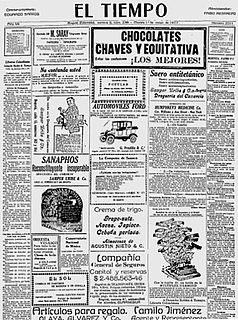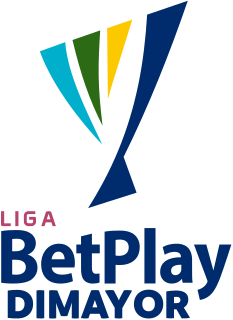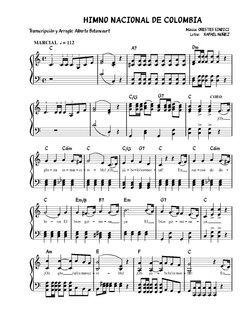
Colombia, officially the Republic of Colombia, is a country in South America with an insular region in North America. It is bordered by the Caribbean Sea to the north, Venezuela to the east, Brazil to the southeast, Ecuador and Peru to the south, the Pacific Ocean to the west and Panama to the northwest. Colombia comprises 32 departments and the Capital District of Bogotá, the country's largest city. It covers an area of 1,141,748 square kilometers (440,831 sq mi), with a population of around 52 million. Colombia's cultural heritage reflects influences by various Amerindian civilizations, European settlement, enslaved Africans, as well as immigration from Europe and the Middle East. Spanish is the nation's official language, besides which over 70 languages are spoken.

Pablo Emilio Escobar Gaviria was a Colombian drug lord and narcoterrorist who was the founder and sole leader of the Medellín Cartel. Dubbed "the king of cocaine", Escobar is the wealthiest criminal in history, having amassed an estimated net worth of US$30 billion by the time of his death—equivalent to $70 billion as of 2022—while his drug cartel monopolized the cocaine trade into the United States in the 1980s and early 1990s.

Bogotá, officially Bogotá, Distrito Capital, abbreviated Bogotá, D.C., and formerly known as Santa Fe de Bogotá during the Spanish period and between 1991 and 2000, is the capital of Colombia, and one of the largest cities in the world. The city is administered as the Capital District, as well as the capital of, though not part of, the surrounding department of Cundinamarca. Bogotá is a territorial entity of the first order, with the same administrative status as the departments of Colombia. It is the political, economic, administrative, and industrial center of the country.

Santiago de Cali, or Cali, is the capital of the Valle del Cauca department, and the most populous city in southwest Colombia, with 2,227,642 residents according to the 2018 census. The city spans 560.3 km2 (216.3 sq mi) with 120.9 km2 (46.7 sq mi) of urban area, making Cali the second-largest city in the country by area and the third most populous after Bogotá and Medellín. As the only major Colombian city with access to the Pacific Coast, Cali is the main urban and economic center in the south of the country, and has one of Colombia's fastest-growing economies. The city was founded on 25 July 1536 by the Spanish explorer Sebastián de Belalcázar.

El Dorado International Airport is an international airport serving Bogotá, Colombia and its surrounding areas. The airport is located mostly in the Fontibón district of Bogotá, although it partially extends into the Engativá district and the municipality of Funza in the Western Savanna Province of the Cundinamarca Department. It served over 35 million passengers in 2019 and 740,000 metric tons of cargo in 2018, making it the second busiest airport in South America in terms of passenger traffic and the busiest in terms of cargo traffic. El Dorado is also by far the busiest and most important airport in Colombia, accounting for just under half (49%) of the country's air traffic.

The Medellín Cartel was a powerful and highly organized Colombian drug cartel and terrorist organization originating in the city of Medellín, Colombia that was founded and led by Pablo Escobar. It is often considered the first major “drug cartel” and was referred to as such due to the organization's upper echelons being built on a partnership between multiple Colombian traffickers operating alongside Escobar. Included were Jorge Luis Ochoa Vásquez, Juan David Ochoa Vásquez, José Gonzalo Rodríguez Gacha and Carlos Lehder. The cartel operated from 1970 to 1993 in Bolivia, Colombia, Panama, Central America, Peru, the Bahamas, the United States, as well as in Canada. Although the organization started out as a smuggling network in the early 1970s, it wasn't until 1976 that the organization turned to trafficking cocaine. This was a result of Escobar getting introduced to the lucrative idea of cocaine smuggling by fellow Colombian trafficker Griselda Blanco. At the height of its operations, the Medellín Cartel smuggled multiple tons of cocaine each week into countries around the world and brought in up to US$60 million daily in drug profits.

The Estadio Nemesio Camacho El Campín, commonly known as El Campín, is the main stadium of Bogotá, Colombia. It was inaugurated on 10 August 1938 and has a current capacity of 36,343 spectators. It is the home ground of the Categoría Primera A teams Millonarios F.C and Santa Fe.

The Colombian Conservative Party is a conservative political party in Colombia. The party was formally established in 1849 by Mariano Ospina Rodríguez and José Eusebio Caro.

Panela or rapadura is an unrefined whole cane sugar, typical of Central and Latin America. It is a solid form of sucrose derived from the boiling and evaporation of sugarcane juice. Panela is known by other names in Latin America, such as chancaca in Chile, Bolivia, and Peru, piloncillo in Mexico. The name piloncillo means "little loaf", because of the traditional shape in which this smoky, caramelly, and earthy sugar is produced. Just like brown sugar, two varieties of piloncillo are available; one is lighter (blanco) and one darker (oscuro). Unrefined, it is commonly used in Mexico, where it has been around for at least 500 years. Made from crushed sugar cane, the juice is collected, boiled, and poured into molds, where it hardens into blocks. Panela is also known as rapadura in Portuguese. Elsewhere in the world, the word jaggery describes a similar foodstuff. Both are considered noncentrifugal cane sugars.

El Tiempo is a nationally distributed broadsheet daily newspaper in Colombia launched on January 30th, 1911. As of 2019, El Tiempo had the highest circulation in Colombia with an average daily weekday of 1,137,483 readers, rising to 1,921,571 readers for the Sunday edition.

The Categoría Primera A, commonly referred to as Liga BetPlay Dimayor due to sponsorship by online betting company BetPlay, is a Colombian professional league for association football clubs. It is the country's premier football tournament and sits at the top of the Colombian football league system.

Colombians are people identified with the country of Colombia. This connection may be residential, legal, historical or cultural. For most Colombians, several of these connections exist and are collectively the source of their being Colombian.

The Bank of the Republic is the central bank of Colombia. It was initially established under the regeneration era in 1880. Its main modern functions, under the new Colombian constitution were detailed by Congress according to Ley 31 de 1992. One of them is the issuance of the Colombian currency, the peso. The bank is also active in promoting financial inclusion policy and is a leading member of the Alliance for Financial Inclusion.

The Civil Aviation Authority of Colombia is a government agency of the Colombian Ministry of Transport. It is the agency in charge of regulating civil aviation, the aviation industry, and of managing the Colombian airspace. Aerocivil is also in charge of managing and controlling all of Colombia's public airports. It is headquartered in the new Aerocivil building on the property of El Dorado International Airport. Previously it was located on the fourth floor of the main terminal building of the airport.

Ishbi-Erra was the founder of the dynasty of Isin, reigning from c. 2017 — c. 1986 BC on the middle chronology or 1953 BC — c. 1920 BC on the short chronology. Ishbi-Erra was preceded by Ibbi-Sin of the third dynasty of Ur in ancient Lower Mesopotamia, and then succeeded by Šu-ilišu. According to the Weld-Blundell Prism, Išbi-erra reigned for 33 years and this is corroborated by the number of his extant year-names. While in many ways this dynasty emulated that of the preceding one, its language was Akkadian as the Sumerian language had become moribund in the latter stages of the third dynasty of Ur.

Corruption in Colombia is a pervasive problem at all levels of government, as well as in the military and police forces. A general culture and awareness of this corruption permeates society as a whole. A Global Corruption Barometer survey from 2010 found that the institutions seen as most corrupt were the political parties and the parliament, followed by the police and public officials, the judiciary and the military. Transparency International's 2021 Corruption Perceptions Index, based on experts' and businesspeoples' perceptions of corruption in the public sector, gave Columbia a score of 39 on a scale from 0 to 100. When ranked by score, Colombia ranked number 87 among the 180 countries in the Index, where the country ranked number 1 is perceived to have the most honest public sector.

The "National Anthem of the Republic of Colombia" is the official name of the national anthem of Colombia. It was originally written as a poem in 1850 by future President Rafael Núñez as an ode to celebrate the independence of Cartagena. The music was composed by Italian-born opera musician Oreste Síndici, at the request of Bogotan actor José Domingo Torres, during the presidency of Núñez, and with lyrics refined by Núñez himself, it was presented to the public for the first time on 11 November 1887. The song became very popular and was quickly adopted, albeit spontaneously, as the national anthem of Colombia.

Institute of Indonesian Arts and Culture, Bandung, is a state-owned, arts and cultural-oriented educational institution located in Bandung, Indonesia.

The COVID-19 pandemic in Colombia is part of the pandemic of coronavirus disease 2019 caused by severe acute respiratory syndrome coronavirus 2. The virus was confirmed to have reached Colombia on 6 March 2020.















